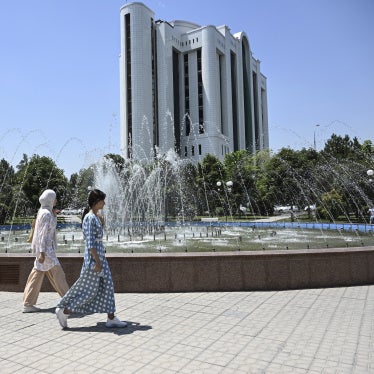(Berlin) – Governments should mark Labor Day on May 1, 2014 with a commitment to create legally binding standards to prevent forced labor, and to protect and compensate victims, Human Rights Watch said today. The International Labour Organization (ILO) estimates that 20.9 million women, men, and children worldwide are trapped in forced labor.
The International Labour Organization’s Convention 29 on Forced Labor, one of the most important treaties in international labor law, was adopted in 1930 and has been ratified by 177 countries. But many of its provisions are out of date. Governments, trade unions, and employers’ groups will meet in Geneva in June to negotiate supplementary standards that better address contemporary abuses. Human Rights Watch said the new standards should be legally binding.
“Millions of people around the world remain trapped in horrific, exploitative conditions of forced labor that shock the conscience,” said Nisha Varia, senior women’s rights researcher at Human Rights Watch. “Members of the ILO should push hard to equip governments with strong, effective standards and modern strategies for implementing them.”
The treaty’s definition of forced labor and the requirement to make it a penal offense have become integrated into national and international standards. However, most other provisions address forced labor in overseas colonies and are no longer relevant or in effect. Patterns of forced labor have shifted. The ILO estimates that 90 percent of forced labor now takes place in the private economy, including in homes, local businesses, organized crime, and multinational supply chains.
Updated global standards on forced labor would complement anti-trafficking efforts, given the strong overlap between forced labor and trafficking. However, anti-trafficking efforts in many countries have been geared toward trafficking for sexual exploitation, with relatively little attention to identifying and protecting the victims of labor trafficking. Of the more than 18 million people in forced labor in the private economy, the ILO estimates that 4.5 million are victims of sexual exploitation and 14.2 million are victims of labor exploitation.
ILO members will vote on whether these new supplementary standards should be a legally binding protocol that countries could ratify or a non-binding recommendation. In their preliminary indications of their positions, governments are split. Those in favor of legally binding standards include Brazil, China, France, Germany, Mexico, Russia, South Africa, and the United States. Those that prefer a non-binding recommendation include Australia, Argentina, Chile, India, Indonesia, the Netherlands, Norway, Qatar, the Philippines, and Sweden.
“Making a commitment to basic prevention and protection measures to eliminate forced labor shouldn’t be optional,” Varia said. “It’s shocking that despite many governments’ public commitments to fight forced labor, they are reluctant to support the strong protections that could help stop these terrible abuses.”
In the past decade, Human Rights Watch has published 49 reports on forced labor. They cover abuses such as forced begging by children; exploitation in domestic work, construction, agriculture, and mining; forced labor in prisons and drug detention centers; and indefinite conscription. Many victims work long hours in hazardous conditions for little or no pay, face psychological, physical, or sexual abuse, and do not have the freedom to leave because of confinement, debt bondage, threats of retaliation, or other conditions.
These abuses are often hidden from the public eye and carry financial costs for victims and society. The ILO estimates that workers in forced labor situations lose US$21 billion in wages each year and those exacting forced labor make $44 billion in illegal profits. Countries also lose billions of dollars in tax income and social security contributions.
In a recent report, Human Rights Watch described what happened to Andrea N., a Filipina domestic worker who went to London with her diplomat employer and his family from a Gulf country. Andrea N. looked after the family’s children, cooked, and cleaned, seven days a week, with no day off. She started at 6 a.m. and worked until 10 or 11 p.m. every night. “Before we came here, the contract said my salary would be £1,000 [per month], but they paid me £200,” she told Human Rights Watch. “They locked me up in the house in London and when we went outside sometimes they didn’t give me food.”
Selected testimonies from Human Rights Watch reports on forced labor:
In Senegal, at least 50,000 children attending residential Quranic schools are in conditions of forced labor. They are forced to beg and to earn daily quotas of food and money to give to their teachers. Ibrahima T., a 13-year-old boy, told Human Rights Watch: “Every time I could not complete the quota by 10 a.m., one of the grand talibés [assistant teachers] would take me into a room and chain me around my ankles. Then he would beat me with electric cable or a tire strip – the strikes were too numerous to count.... The punishment was the same for arriving late. If I came back after 10 a.m., even with the quota, I was chained until nighttime and beaten.”In Vietnam, government-run drug detention centers, mandated to “treat” and ”rehabilitate” drug users, are little more than forced labor camps where drug users work six days a week processing cashews, sewing garments, or manufacturing other items. Vu Ban was in his late 20s when he was detained in Center No. 2 (Lam Dong province) for five years. He told Human Rights Watch “I had a quota of 30 kilos [of cashews] a day and worked until they were done. If you refused to work you were sent to the punishment room and after a month [there] you agreed to work again.”
In Qatar, Raju S., a 20-year-old worker from Nepal, said that a recruiter promised him a job working in an office earning 1200 riyals (US$329) a month. He paid the agent 130,000 Nepali rupees (US$1,781). When he arrived, his employer instead made him work in construction and paid him only 600 riyals (US$165) a month. When he tried to refuse the conditions, his employer demanded an additional 1000 riyals (US$275) to break his contract. Raju S. said he had to stay to repay his loans.








